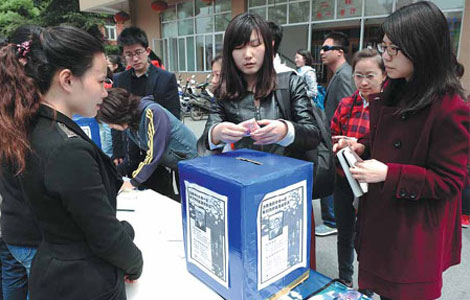US bond-buying policy may benefit China, economists say
Updated: 2013-05-03 07:34
By Chen Jia (China Daily)
|
|||||||||||
The Chinese economy is expected to benefit from a more confident external environment, fueled by a gradual global economic recovery this year, according to local economists.
Reacting to the US Federal Reserve's decision on Thursday to continue its bond-buying policy - an effort to support economic recovery and encourage job creation by fueling capital liquidity - they said the move might also stabilize China's foreign trade, helped by improved worldwide money flow.
The Federal Open Market Committee, or FOMC, announced it could adjust the pace of bond-purchases - currently at $85 billion per month - depending on changes in its labor market and inflation.
"It is a sign that the Fed's policy may become more flexible, despite the unchanged target to maintain near-zero interest rates unless the unemployment rate retreats to lower than 6.5 percent and inflation expectation exceeds 2.5 percent," said Liu Yuanchun, assistant dean of the School of Economics at the Renmin University of China.
Liu added the move also means that US quantitative easing may become more intense if any economic recovery stagnates.
He added that the Fed's loosening monetary policies, to some extent, have supported the recovery of the US economy, which has helped ease global trade, to the benefit of the export-oriented Chinese economy.
Recently released US indicators, including manufacturing production, unemployment and retail sales, have collectively pointed to a slowdown since the second quarter.
A report from Nomura Securities Co Ltd has suggested that "solid US job creation, not accompanied by strong economic growth, would pose a dilemma for the FOMC regarding the course of its current asset purchase program".
It added: "We think the Fed will continue its asset purchase programs as long as the economic recovery remains weak, even if the pace of job creation picks up."
The European Central Bank and the Bank of Japan have also kept up with monetary loosing measures.
According to Lim Say Boon, chief investment officer at Asian financial services group DBS, excess global liquidity - defined as the growth of money supply in excess of economic growth - is likely to pick up again as the Bank of Japan accelerates its quantitative easing, and as the European Central Bank activates its Outright Monetary Transactions program.
Zhu Baoliang, an economist at the State Information Center, a think tank under the National Development and Reform Commission, said that easing monetary measures may be the only way to stimulate growth in developed countries, as the fiscal policy adjustment space is "too limited".
In the mid to long-term, figures show that a worldwide economic recovery is continuing, although with weak momentum.
In a report, the Bank of Communications has predicted that exports to the US will be higher this year than in 2012, while the growth of new orders from European may remain modest.
"Without a sharp deterioration in the overseas market, China's exports and imports are likely to achieve stable expansion this year," it added.
Zhu Haibin, chief China economist with JPMorgan Chase, said it is predicting that the eurozone may be out of its economic quagmire by the start of the second half of the year, which may boost China's exports.
Liu also thinks the external economic situation is likely to continue improving.
The Chinese economy suffered an unexpected slowdown in growth in the first quarter to 7.7 percent from 7.9 percent in the fourth quarter of 2012.
Policymakers have again emphasized a shift away from the country's export-driven growth model, with a focus on quality and profitability, and more domestic consumption.
Both official government and HSBC manufacturing PMIs in April showed slower expansion in the industrial economy, which points to increasing downside risk in the second quarter, said economists.
"A tougher task for the new leadership is to focus on internal reforms to create more domestic demand, while tightening the capital controls to prevent large inflows of speculative fund from overseas," Liu said.
Related Stories
Gains from local govt bonds to be exempt from income tax 2013-04-26 21:19
Interbank bond market review expected 2013-04-25 09:30
CNPC plans dollar bonds as borrowing costs drop 2013-04-10 15:23
China's railway bonds rating to remain intact 2013-03-13 17:25
China plans bond overhaul to fund $6t urbanization 2013-03-01 10:59
Today's Top News
Detention of petitioners denounced
Lawyers get an advocate
Pentagon accusation on China's military rejected
Foster homes for homeless children
Public hearing to discuss taxi fare increase
21 Party officials, SOE managers disciplined
Clarity on tax evasion needed, lawmakers told
Visa policy to attract global tourists
Hot Topics
Lunar probe , China growth forecasts, Emission rules get tougher, China seen through 'colored lens', International board,
Editor's Picks

|

|

|

|

|

|





